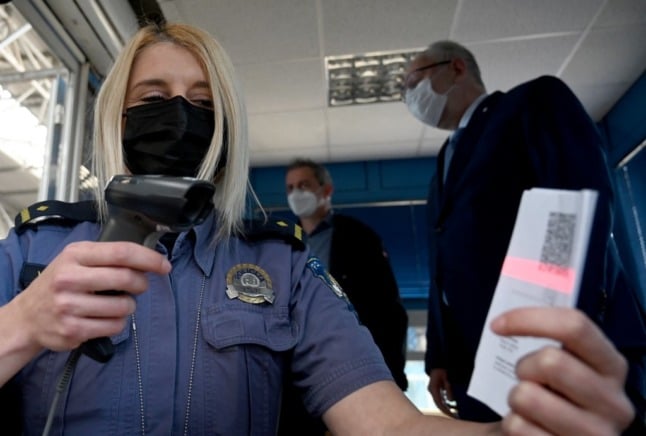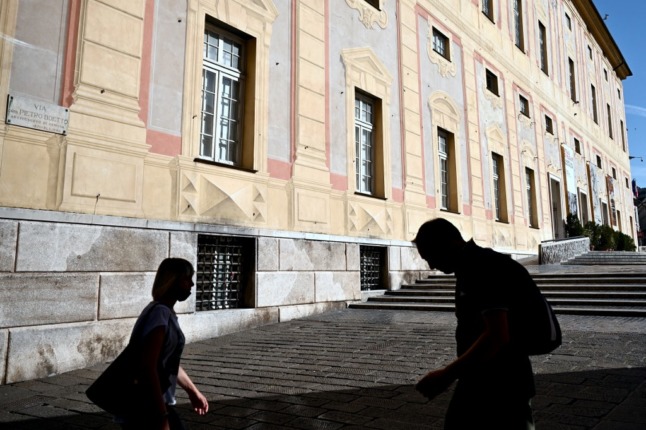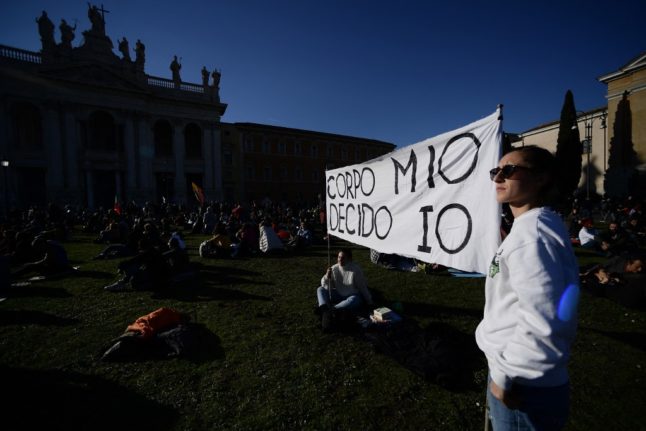Italy is planning to require people to show proof of full vaccination, testing or recovery in order to enter more venues as early as next week under an expansion of the use of its certificazione verde or ‘green certificate’.
The change could make showing a digital ‘green pass’ compulsory to access domestic flight, long-distance trains, nightclubs, gyms, sports stadiums and even possible indoor seating in restaurants.
EXPLAINED: What people vaccinated in Italy need to do to get the Covid ‘green pass’ travel certificate
The government is also reportedly considering making the health pass mandatory for passengers on long-distance trains and domestic flights.
Under the rule changes, the government is expected to make the green pass available in the case of vaccination only for those who are fully immunised – instead of 15 days after the first dose as is currently the case. This would bring Italian rules in line with those in most other European countries.
While nothing has yet been officially confirmed, Italian media reports suggest the timing of the new decree means changes could come into effect as soon as next Monday, July 26th.
Ministers are reportedly still debating various details of the new decree on Wednesday, and an announcement is now expected to come on Thursday.
The expansion of the green pass is being discussed along with new risk parameters for Italy’s regions and an extension of the national state of emergency possibly until the end of this year.
The new decree may also include a requirement for teaching staff to be vaccinated ahead of the start of the new school year.

The green pass has been in use since June 17th, but at present it is only needed for international travel within Europe, and in Italy it can be used to access care homes or large events like concerts, sports matches and wedding receptions.
Italy has been looking at ways to expand the use of the health pass after France last week announced a similar extension to its version of the scheme in order to slow rising infection rates and to encourage vaccinations.
Italian health authorities have said that extending the health pass scheme could be a useful way to give unvaccinated people an extra incentive to book a jab, though the main purpose is thought to be avoiding reinstating blanket restrictions during the peak summer holiday season.
Analysis: How much longer will all of Italy remain a Covid-19 ‘white zone’?
As Italy enters a fourth wave of coronavirus infections, fuelled by the more contagious Delta variant, several regions are nearing the threshold at which some health measures would need to be brought back under the country’s four-tiered system of restrictions.
The number of new coronavirus infections recorded in Italy has doubled over the past week, with the national average now at 29 new cases per 100,000 inhabitants.
With significant variations in the numbers between regions, the areas seeing the sharpest rises in cases currently are Sardinia, Sicily, Veneto. Campania and Lazio, according to the most recent weekly health data report published by the Higher Health Institute (ISS) and Italian health ministry.
For now, every part of Italy is currently classed as a low-risk ‘white’ zone.
If regions turn ‘yellow’, renewed restrictions would include restrictions on indoor dining at restaurants and a return of the requirement to wear masks outdoors in all public places.
With concerns about the impact this might have on businesses, the health ministry is now planning to change the ‘yellow zone’ criteria.

Health Minister Roberto Speranza confirmed on Sunday that, under a revision of the zone system, hospitalisation and intensive care occupancy rates will become more important factors in deciding whether to impose new restrictions.
“The number of infected people is rising, especially among children, but in most cases there is no need for hospitalisation and for this reason we have chosen to leave businesses open, favouring those who decide to inoculate themselves in order to prevent the circulation of the virus,” Speranza told reporters on Sunday.
The government is hoping that the extended green pass system and altered parameters will be enough to keep restrictions low and businesses open until at least the Ferragosto holiday in mid-August, according to Italian media reports.
READ ALSO: What do Italians think of the extended Covid ‘green pass’ scheme?
However, the plan to expand the green pass has faced criticism from some experts who point out that many people are still facing long waits for vaccination appointments, while free testing is not available in every region or city.
Many people who have been vaccinated are also reporting having trouble accessing the digital green pass due to missing access codes and other technical problems.
Meanwhile there are questions about how the scheme could be enforced in practice, as commentators argue that only police, and not business owners, would have the right to check health passes.
Who can use Italy’s ‘green pass’?
At the moment Italy’s digital health certificate is available to people who were vaccinated, tested or recovered in Italy.
People from EU and Schengen zone countries, as well as the US, Canada and Japan, can also enter Italy and access venues under ‘green pass’ terms but need to show equivalent health documents issued in their own country.
It appears likely that these rules will remain the same for visitors under the expanded scheme, though nothing has yet been officially confirmed.
Find further details about Italy’s green certificate on the official website (currently only available in Italian).
For more information about the current coronavirus situation and health measures in Italy please see the Health Ministry’s website (in English).



 Please whitelist us to continue reading.
Please whitelist us to continue reading.